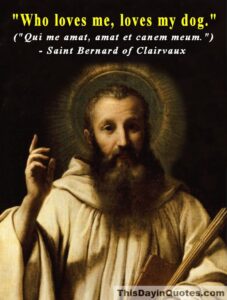
In the Catholic religion, August 20 is the Feast Day of Saint Bernard of Clairvaux, a medieval French monk who died on that date in 1153 A.D.
I’m not a Catholic. But as a dog lover and a quote lover, I’m a big fan of St. Bernard, because he’s the guy who immortalized a saying that’s now best known in the modernized form “Love me, love my dog.”
The older versions of this saying, cited by many books and websites, are “Who loves me, loves my dog” and “He who loves me, also loves my dog.”
Those are the more traditional and more grammatically correct translations of something Bernard said in a sermon he once gave on another Catholic feast day — the Feast of St. Michael the Archangel, celebrated annually on September 29.
St. Bernard’s famous dog quote from that sermon was originally recorded in Latin as “Qui me amat, amat et canem meum.” (Back then, it was common for monks to use Latin for their written records and to deliver sermons in Latin to other monks.)
The full sentence this quote comes from is “Dicitur certe vulgari proverbio: Qui me amat, amat et canem meum” — which translates as “It is said truly in a common proverb: who loves me, also loves my dog.”
This makes it clear that Bernard was quoting an existing proverb. He didn’t actually coin it himself. But his use became famous and helped popularize the saying.
Contrary to what some people assume, St. Bernard of Clairvaux is not the Catholic saint associated with Saint Bernard dogs.
They were named after Saint Bernard of Menthon (a.k.a. Bernard of Montjoux), a different Catholic monk who died in 1008 A.D.
That St. Bernard established a monastery and hospice high up in the Alps. Over the centuries, the monks who lived there became famous for their efforts to rescue lost and injured travelers and for the large herding dogs they bred and trained to assist in their search and rescue missions. Since the 1700s, those dogs have been called Saint Bernards.
 It’s not clear whether St. Bernard of Menthon or St. Bernard of Clairvaux were especially fond of dogs themselves.
It’s not clear whether St. Bernard of Menthon or St. Bernard of Clairvaux were especially fond of dogs themselves.
St. Bernard of Menthon is the patron saint of skiing, not dogs or dog lovers. And, the breed of dogs named in his honor was developed by his followers after his death.
St. Bernard of Clairvaux is the patron saint of bees, beekeepers and candle-makers, apparently because Pope Pius VIII nicknamed him the “Honey-Sweet Doctor” for his honey-sweet style of preaching and writing.
And, for the record, the topic of the sermon by St. Bernard of Clairvaux that includes the words now paraphrased as “Love me, love my dog” wasn’t actually about canines. It was about angels and their love for humanity.
Bernard’s brief reference to dogs in the sermon was part of a metaphorical point he was making.
If you read (or use an online translator to decipher) the Latin transcription of his sermon, you find that he was comparing the relationship between dogs and people to the relationship between humans and Jesus.
“The holy angels…love us, in fact, because Jesus Christ loved us,” Bernard said in Paragraph 3 of the sermon. “It is said truly in a common proverb: who loves me, also loves my dog…We are the little dogs of the Lord…yes, like small dogs that want to feed on the crumbs that fall from the table of our masters.”
In case you’re wondering, there is a Catholic patron saint of dogs. His name is Saint Roch and his feast day is August 16.
According to legend, in the 13th century, Roch became gravely ill after ministering to plague victims and went off into the woods to die.
His life was saved by a dog from a nearby home. The dog accidentally found Roch, then brought him food to eat every day and licked his sores until he recovered.
I particularly like that legend because it fits my view that the creatures appropriately called “man’s best friend” are among the true saints of this world.
* * * * * * * * * *
Comments? Corrections? Questions? Email me or post them on my Famous Quotations Facebook page.
Related reading and stuff…












